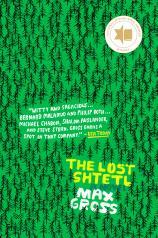The Lost Shtetl
Review
The Lost Shtetl
To say that Kreskol is the village that time forgot is to understate the situation. Life in the Polish shtetl, hidden deep in a forest, has remained virtually unchanged in a couple hundred years. There is no electricity or outdoor plumbing, and residents have never seen trains, buses or helicopters. Very few leave, and those who do are generally presumed dead, lost in the wilderness surrounding Kreskol. Still, when Pesha Rosenthal Lindauer and her ex-husband, Ishmael, go missing, the local rabbis suspect foul play and send Yankel Lewinkopf to the nearest city, Smolskie, to notify the police.
This sets into motion Kreskol’s introduction to the contemporary world and an unlikely romance in Max Gross’ debut novel, THE LOST SHTETL.
"In the tradition of tall tales, THE LOST SHTETL is silly and wondrous yet thoughtful and smart. Gross’ narrative is sprawling and still controlled --- engaging, funny and heartbreaking all at once."
Yankel Lewinkopf, just 19, is the orphaned son of a deceased prostitute and has spent most of his life passed around among relatives, from aunts and uncles to grandparents, who treat him more or less kindly. His general pliancy and need to be useful make him a perfect errand boy, and he is sent to Smolskie with a caravan of Roma, a bag of food and two letters: one in Yiddish and the other in Polish. The world that Yankel finds in Smolskie is about as far from Kreskol as one could get. It is teeming with busy people, clearly gentiles, tall glass and steel structures, and fast and noisy automobiles. No one speaks Yiddish, and Yankel’s Polish is scant; in his old-fashioned clothes and unintelligible language, not to mention his story of a whole Polish shtetl that somehow escaped the Holocaust, he is dismissed as a crazed man and eventually institutionalized.
As Yankel learns about the world from the relative safety of the hospital, the doctors there realize he is not insane and begin to entertain the possibility that he is telling the truth about Kreskol and its miraculous survival in near-isolation. His return to Kreskol opens the floodgates of public attention and the influx of modernity. The developments are rapid and often frightening, of course with results both hilarious and thoughtful for readers and characters alike. A paved road now leads into Kreskol, and the media descends upon the village. The economy is upended, and gentiles move in for the first time in generations. The Polish government builds a post office and demands a census.
All the while, the people of Kreskol must confront the realities of the world in which they now find themselves --- a post-Holocaust Europe and one in which the modern state of Israel exists. Perhaps, they begin to think, they were better off isolated and in the literal and figurative dark. For Yankel and Pesha, their years out of Kreskol mean that if they do return home, they do so radically changed.
In presenting this entertaining “what if” of a novel, Gross also asks readers to think critically about modernity and identity, community and transformation, and the meaning of home. He ponders cultural and familial inheritance and the modern condition, even while telling a delightfully improbable story. In the tradition of tall tales, THE LOST SHTETL is silly and wondrous yet thoughtful and smart. Gross’ narrative is sprawling and still controlled --- engaging, funny and heartbreaking all at once. Only the authorial or editorial condition to unnecessarily footnote Jewish terms and Polish vocabulary may take readers out of this world.
Gross’ questions and answers here are profoundly Jewish, but they parallel so many universal concerns about what is lost and what is gained as nations and communities are impacted by the gifts and horrors brought with the march of time and as individuals are altered by the joys and aches of love.
Reviewed by Sarah Rachel Egelman on October 16, 2020
The Lost Shtetl
- Publication Date: October 5, 2021
- Genres: Fiction
- Paperback: 416 pages
- Publisher: HarperVia
- ISBN-10: 0062991132
- ISBN-13: 9780062991133




